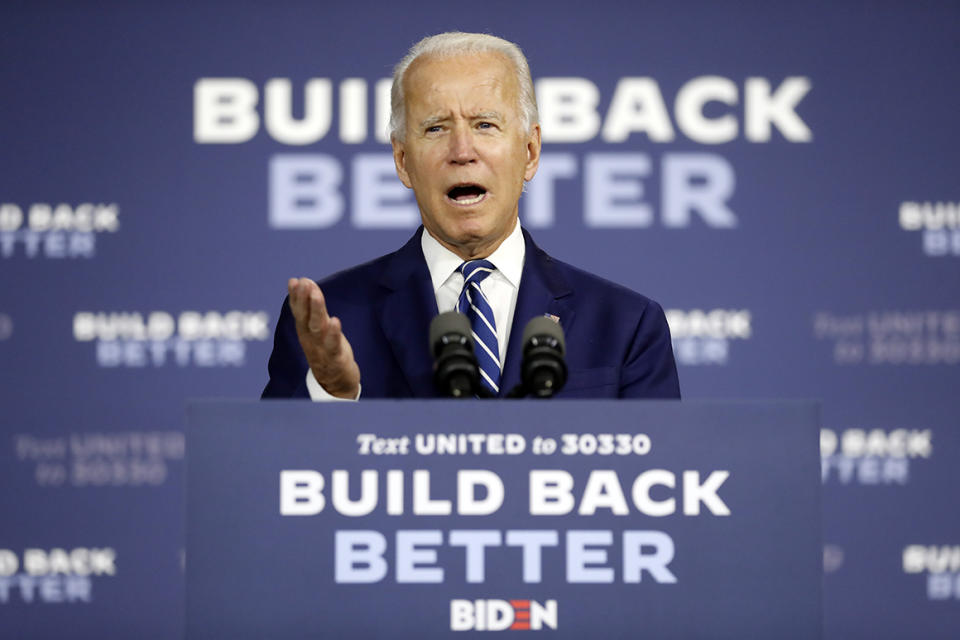Senate Republicans: No reason for Biden to 'sound the alarm' on Russia
Senior Senate Republicans are rejecting Joe Biden's amped-up public warnings about Russian interference in this year's presidential election, saying foreign adversaries' efforts to meddle in U.S. democracy are nothing new after the Kremlin's hacking operation four years ago.
"I think to sound an alarm is to be ignorant of everything that we’ve done since 2016," said Sen. Richard Burr (R-N.C.), who until two months ago chaired the Senate Intelligence Committee and steered the panel's yearslong bipartisan probe into Russia's digital assault on the race between Donald Trump and Hillary Clinton.
Sen. Marco Rubio (R-Fla.), who has temporarily assumed the reins from Burr, warned that "multiple countries are now engaged in informational warfare, trying to divide our country, trying to pit us against each other."
“It’s not new. It’s something we’re going to face for a long time, unfortunately,” said Rubio, adding that he didn’t know what, if any, specific incidents Biden was reacting to. Rubio is the favorite to get the Intelligence committee gavel permanently if Republicans keep control of the Senate in November.
Senate Homeland Security Chair Ron Johnson (R-Wis.) suggested that Russia has been interfering in Western elections “for decades.”
“Does it surprise me if China's probably doing the same thing? Not at all,” he told POLITICO.
The GOP comments came a day after Biden offered his starkest warnings to date against any interference by Russia or other foreign governments like China.
“I am putting the Kremlin and other foreign governments on notice,” the former vice president said Monday, three days after disclosing that he had begun to receive briefings from U.S. intelligence officials as the presumptive Democratic nominee. “If elected president, I will treat foreign interference in our election as an adversarial act that significantly affects the relationship between the United States and the interfering nation’s government.”

He echoed that statement later during a campaign event where he promised economic sanctions, cyber reprisals and any other necessary actions to “counter such clear assault on our national sovereignty."
The remarks did receive a warm welcome from one group: congressional Democrats dismayed by the Obama administration’s muted public response to the Kremlin’s efforts in 2016.
Biden’s statement “was the kind of statement, frankly, that a president would make,” House Intelligence Chair Adam Schiff (D-Calif.) said Tuesday. “I think it will have a deterrent impact.”
Schiff noted that it has been almost exactly four years since he and California Sen. Dianne Feinstein, then the top Democrat on the Senate Intelligence Committee, issued their own joint statement on the Kremlin’s election interference “because we could not get the administration at that time to issue a statement of their own.”
“Ironically it was because they were concerned that they would be perceived as rigging the election by calling out foreign interference,” Schiff noted. “Now that never made sense to me.”
More harshly, Johnson argued that the Obama administration “didn’t do anything” to stop the Kremlin’s attack in 2016.
The Obama administration eventually called out Moscow publicly in October 2016 for Russia's hacking of computers at the Democratic National Committee and the Democratic Congressional Campaign Committee. But those charges were drowned out within hours by major news bursts — the revelation of the “Access Hollywood” tape in which Trump boasted of sexually assaulting women, and WikiLeaks’ mass dumping of emails from Clinton’s campaign chair.
Months after Trump's victory, U.S. intelligence agencies issued a joint statement that the Russians had "developed a clear preference for President-elect Trump," a conclusion that Burr's committee endorsed just three months ago.
"We’ve all learned that we need to call out foreign interference early and often if it continues, there needs to be repercussions for it, the American people need to be kept informed of it," Schiff said.
Biden himself has said that Senate Majority Leader Mitch McConnell stopped the Obama administration from speaking out more bluntly about Russian interference in 2016 by refusing to sign onto a bipartisan statement of condemnation — a charge the Kentucky Republican has denied.
Sen. Amy Klobuchar (D-Minn.), herself once a 2020 presidential contender, said Biden’s latest remarks show he has learned from 2016, especially considering how Russian hackers have stepped up their online operations since then.
She cited last week’s joint announcement by the U.S. and the United Kingdom that hackers backed by Moscow were attempting to steal Covid-19 vaccine research.
“If you think they have a limit, they have no limit,” she said.
While he welcomed the former vice president's more assertive approach, Schiff suggested that Biden be more specific when talking about the kinds of interference he is warning about.
"We have to be careful to distinguish operations — like hacking and dumping and covert social media campaigns, paid intelligence operations and those types of malign activities — from much more overt influence operations that include writing of editorials and giving public speeches and engaging in diplomatic efforts," Schiff said. "We need to be careful not to equate all foreign efforts to influence the American people."
Sen. Chris Coons (D-Del.), a top Biden ally, said that "every elected official in America is on notice that Russia interfered in our 2016 election" and "it’s important that national leaders of both parties send clear signals: We will not tolerate election interference."

